 Petzlover
Petzlover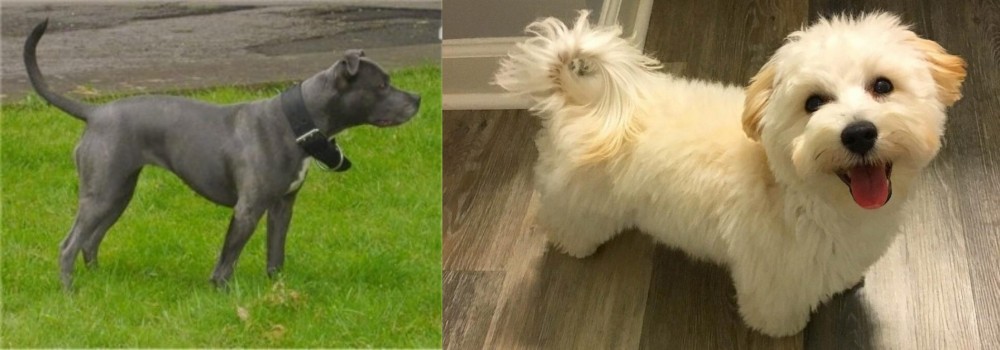 Irish Bull Terrier is originated from United Kingdom but Maltipoo is originated from United States. Irish Bull Terrier may grow 13 cm / 6 inches higher than Maltipoo. Irish Bull Terrier may weigh 12 kg / 27 pounds more than Maltipoo. Both Irish Bull Terrier and Maltipoo has almost same life span. Irish Bull Terrier may have more litter size than Maltipoo. Irish Bull Terrier requires Low Maintenance. But Maltipoo requires Moderate Maintenance
Irish Bull Terrier is originated from United Kingdom but Maltipoo is originated from United States. Irish Bull Terrier may grow 13 cm / 6 inches higher than Maltipoo. Irish Bull Terrier may weigh 12 kg / 27 pounds more than Maltipoo. Both Irish Bull Terrier and Maltipoo has almost same life span. Irish Bull Terrier may have more litter size than Maltipoo. Irish Bull Terrier requires Low Maintenance. But Maltipoo requires Moderate Maintenance
 The Irish Bull Terrier is a variant of the Staffordshire Bull Terrier and is also known as the Irish Staffordshire Bull Terrie.
The Irish Bull Terrier is a variant of the Staffordshire Bull Terrier and is also known as the Irish Staffordshire Bull Terrie.
The dog isn’t particularly well known outside of Ireland and it is also unrecognized by any kennel clubs, although there are some dog organizations which recognize the Irish Staffordshire Bull Terrier and this includes the Dog Registry of America as well as the United National Kennel Club.
Although descended from the Irish Bulldog and the original Staffordshire Pit Terrier, the breed has also been influenced by other dog breeds such as the English White Terrier among others.
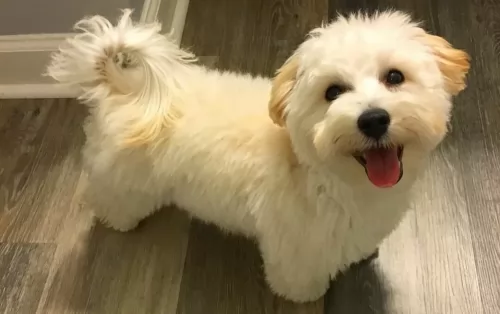 The Maltipoo is a popular dog breed – a cross between the Maltese and Poodle. The dog originates in the United States.
The Maltipoo is a popular dog breed – a cross between the Maltese and Poodle. The dog originates in the United States.
The Maltipoo is a cross breed but it is often referred to as a designer dog because of it being purposely bred. The cute little dog has been created to be a companion dog, suiting allergy sufferers because of him being a low shedder and considered hypoallergenic.
The Maltipoo isn’t officially recognized as a true breed. Some Maltipoo Clubs and Registries have been formed.
 Bred essentially for dog fighting, the Irish Bull Terrier, known also as the Irish Staffie, is a medium sized dog which stands at roughly 43 to 48cm and weighs in at anything from 14kg to 18kg.
Bred essentially for dog fighting, the Irish Bull Terrier, known also as the Irish Staffie, is a medium sized dog which stands at roughly 43 to 48cm and weighs in at anything from 14kg to 18kg.
The dog is muscular, lean and strong with a strong jaw, deep chest, a broad head, short muzzle with round, brown eyes. The ears are half-erect and he has a long, straight tail. The coat of the dog is short and smooth and in different shades of red, fawn, black and brindle. Sometimes there are white markings.
The Irish Staffie has an aggressive temperament when it comes to fighting other dogs, but he loves being with a human family, being a social dog.
Those who have owned the dog say he is a courageous, confident, strong-willed, affectionate, loyal pet who is playful and loves getting up to mischief. He is intelligent too and can be easily trained and socialized, getting on well with children in the home.
This dog seems to have a constant grin on his face and he just loves life. He loves working hard and playing hard and even though he has a history of fighting, with people he is loving and devoted.
He is boisterous and better suited to a strong-minded, active family as he tends to be stubborn, wanting his own way. He can adapt well to life in the city or the country, but wherever he lives, he will require his owners to give him a good amount of exercise.
 The small Maltipoo stands at between 20 and 35cm and weighs about 2 to 6kg. There is no breed standard for this dog. The coat is fluffy and is more inclined to be wavy than curly. It can become quite long and most people prefer to have him professionally clipped.
The small Maltipoo stands at between 20 and 35cm and weighs about 2 to 6kg. There is no breed standard for this dog. The coat is fluffy and is more inclined to be wavy than curly. It can become quite long and most people prefer to have him professionally clipped.
Coat colors vary from white to cream, apricot and brown or it can be a combination of these colors. He has a tail which some people prefer to dock, but if not, the tail is long and curls, sometimes over the back.
Owning a Maltipoo, you’ll quickly discover that this little dog is active, feisty, bright and, fun-loving, and your life is pretty much not going to have a dull moment with him in it.
If you’re a first time dog owner you’ll love the Maltipoo as he is pretty much easy going. He makes an excellent family pet as he is even tempered. Make sure your kids have been taught how to treat him – with respect, gentleness and kindness. Never allow toddlers to climb over any dog – big or small.
The Maltipoo is intelligent too and this means training and socialization will be easy for him. Many people use them as therapy dogs and they definitely seem to have an affinity with older people, bringing joy into their lives with their bright nature.
They are dogs that can adapt to life in the city or the countryside, just so long as they are with their beloved human family. They’re essentially indoor dogs but will gladly venture outdoors if it means ball games on the lawn with the children or a walk outside the confines of his home. This gives him the opportunity to smell new aromas, a physically and mentally stimulating game for him.
 Lots of contact from his human family is what your Irish Bull Terrier will want from you. He is a loving, social dog and close human contact as well as lots of good food and exercise is what he will require from you.
Lots of contact from his human family is what your Irish Bull Terrier will want from you. He is a loving, social dog and close human contact as well as lots of good food and exercise is what he will require from you.
With training and socialization he becomes an awesomely obedient pet, getting on well with adults and children in the home. He is such an entertaining, happy dog and once you've had an Irish Bull Terrier you will find your home empty without one.
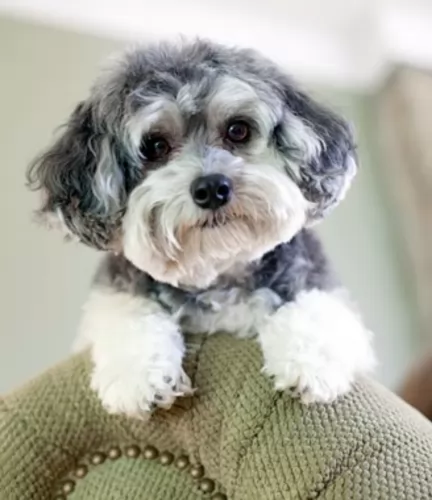 Your Maltipoo is guaranteed to bring much joy into your home. He is a social dog, loving to spend time with his human family, whether indoors our outdoors. He is an active dog so will look forward to his walk every day.
Your Maltipoo is guaranteed to bring much joy into your home. He is a social dog, loving to spend time with his human family, whether indoors our outdoors. He is an active dog so will look forward to his walk every day.
Treat your little pet with love and good care, after all he has got so much companionship to offer and deserves the best there is to that the 12 to 15 years he has are filled with health and happiness.
 Looked after well, your Irish Bull Terrier can reach 14, 15 or 16 years of age. Just like with other dogs, he is prone to some common dog illnesses, of which eye illnesses can be one.
Looked after well, your Irish Bull Terrier can reach 14, 15 or 16 years of age. Just like with other dogs, he is prone to some common dog illnesses, of which eye illnesses can be one.
Production and drainage of fluid is supposed to be balanced in the eye, and Glaucoma comes about when this balance is disrupted. Symptoms include red eye, pain, increased tear production and corneal cloudiness. Your vet may recommend treatment that will decrease inflammation in the eye.
The lens of the eye is usually clear but sometimes it develops a cloudy cataract which blocks light from reaching the back of the eye. The result is poor vision and even blindness. Cataract surgery is available for dogs and your vet can advise you further.
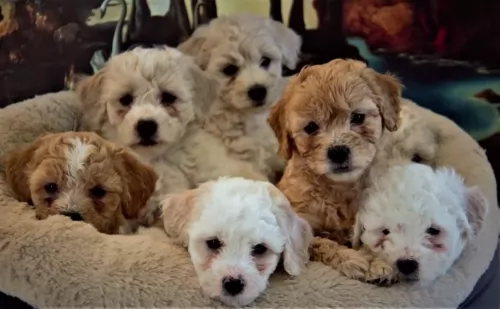 The Maltipoo is such a bright little dog, brimming with energy, but even so, he can get sick, just like with any other dog.
The Maltipoo is such a bright little dog, brimming with energy, but even so, he can get sick, just like with any other dog.
Small dogs are prone to dental problems and gum disease and tartar build up can cause many problems and tooth loss. Any dental infections can lead to infections which can put the entire body in jeopardy.
This is a degenerative eye disorder that can cause blindness and although there is no cure there are things that the vet can do for your pet.
 An Irish Staffordshire Bull Terrier isn't going to require you spending a lot of money on him in terms of grooming. He is a low maintenance dog and his short, smooth coat will only require a good brush once or twice a week as he isn't a heavy shedder.
An Irish Staffordshire Bull Terrier isn't going to require you spending a lot of money on him in terms of grooming. He is a low maintenance dog and his short, smooth coat will only require a good brush once or twice a week as he isn't a heavy shedder.
Brushing him has several advantages – he loves the attention you’re giving him, its a time to check on fleas and ticks and it is excellent conditioning therapy for his coat. A damp cloth can also be used to wipe him down, and this is far better than bathing him with a shampoo that could aggravate his skin.
Your Irish Bull Terrier is an energetic breed and he certainly won't do well in a home where the family leaves him to his own devices day after day in the back yard.
Social and energetic, your pet will want to join you with your daily walks and he finds a ball irresistible. As a responsible dog owner, you will need to see that he gets a fair quota of exercise otherwise you should rather settle for a less active breed.
It goes without saying that such an active dog will require a good diet so ensure he can remain happy and active. Always try and feed your pet the best quality food there is.
If its commercially manufactured food, make sure its high quality and isn’t packed with unwholesome fillers and preservatives. Your vet can always offer sound advice on this aspect.
Some homemade food such as cooked chicken, brown rice and vegetables added to his kibble will do him the world of good and if you can afford it, mix in some raw meat from time to time. Make sure he has access to fresh, cool water.
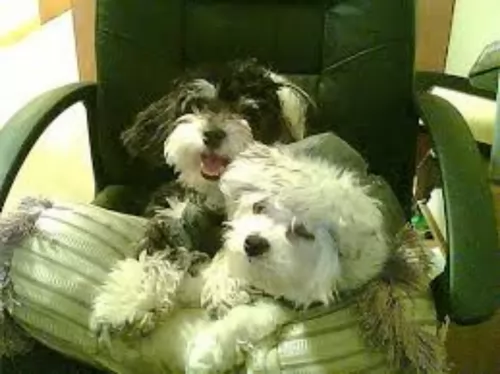 The Maltipoo is such a sweet little dog – you want to be sure that you look after him as well as can be.
The Maltipoo is such a sweet little dog – you want to be sure that you look after him as well as can be.
Always take your pet for regular veterinary check-ups if you suspect he is ill. If you get a Maltipoo puppy you will need to take him to the vet because there are a number of vaccines he will need to prevent him from picking up some life threatening canine diseases. Some of these are parvo and rabies among others.
Also, as your Maltipoo reaches adulthood you will need to decide whether you will have the dog spayed or neutered to prevent puppies.
Groom your Maltipoo to keep the coat in tip top condition. Brush him at least twice a week to keep him free of loose hairs. It’s a nice bonding session for your pet too and it gives you the chance to check for fleas and ticks. Most Maltipoo owners take their pets to professional groomers to have the coat trimmed as then he looks and feels more comfortable in warmer weather.
Be careful about bathing him too often as even the mildest shampoos can irritate his skin and it strips the coat of natural oils. Other grooming needs will require you keeping his nails short and cleaning his teeth at least 2 or 3 times a week. Because he has floppy ears, check inside them as they can collect excess wax and debris.
If you are unsure about these kinds of grooming needs, check with your vet or groomer because doing it wrong could cause injury to your pet.
Give your pet a soft, warm, dry bed to sleep in. You can make a soft ‘nest’ on the floor or you can buy a sleeping platform or traditional dog basket.
With a Maltipoo, choose a high-quality small breed dog food if you are going to feed him commercially manufactured food. This is to ensure he remains healthy. Try and keep your diet simple for your Maltipoo to avoid stomach problems.
For variety, add in some chopped boiled chicken, brown rice and vegetables to his dry kibble. The amount of food you give him will depend on his size and activity levels but you want to avoid feeding him too much so that it leads to obesity. Obesity can bring on a host of dog illnesses.
As opposed to one larger bowl of food, rather feed him two smaller meals which is far healthier for him. Remember to always have a bowl of fresh, cool water standing close by.